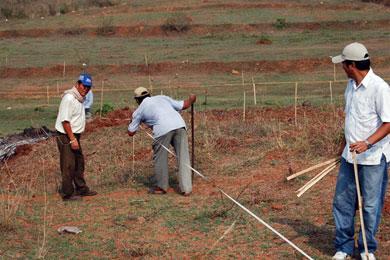Protests Erupt in Patna Against Special Land Survey in Bihar

Patna: Opposition to the special land survey being conducted in Bihar has intensified, with residents staging demonstrations and sit-ins to protest the process. A major sit-in was organized at Gardnibagh, Patna, where protestors voiced their discontent with the government’s handling of the survey.
The Bharatiya Lok Chetna Party has raised serious allegations regarding the ongoing land survey in Gardnibagh. Party leader Subhash Singh, along with other demonstrators, accused survey officials of irregularities. Singh claimed that government employees involved in the survey are engaging in corrupt practices, including demanding bribes to resolve issues related to land mutation, disputes, and document verification. Protestors condemned what they described as “looting” during the survey process.
Protestors also demanded swift resolution of land disputes pending in court. According to the demonstrators, these cases should be settled before the survey continues, ensuring that unresolved issues do not interfere with the land survey process. Additionally, they urged the government to correct errors in online land documents before conducting the survey. Protestors demanded accountability from survey officials, emphasizing that those responsible for any mistakes should be held liable.
Another significant demand made during the sit-in was related to reservation policies. Protestors called for the government to increase the reservation limit for marginalized communities, demanding that reservation quotas for OBCs, EBCs, and SC/ST communities be proportionate to their population. They proposed a 65% reservation for backward classes, 25% for SC/ST groups, and 10% for upper castes.
The protestors also demanded that the reservation system be extended to private institutions, in addition to government and semi-government sectors. They sought the implementation of reservation in all sectors, including the legislature, judiciary, and executive, to ensure that marginalized communities are adequately represented in proportion to their population.
With growing opposition, the protestors have made it clear that they expect the government to address these concerns promptly. As the demonstrations continue, the demand for transparency, justice, and inclusivity in the land survey and reservation policies remains at the forefront of the movement.





